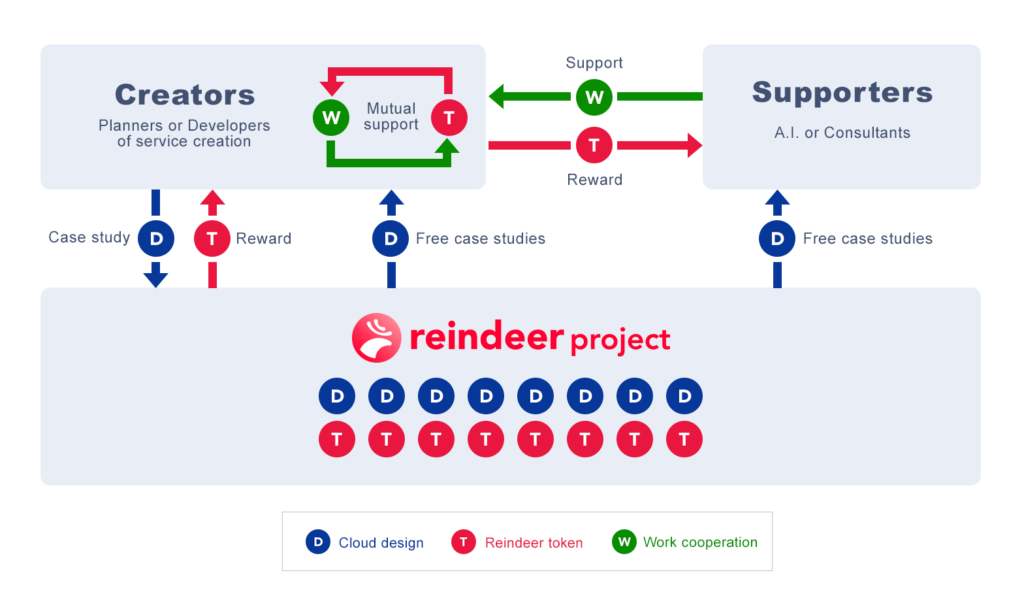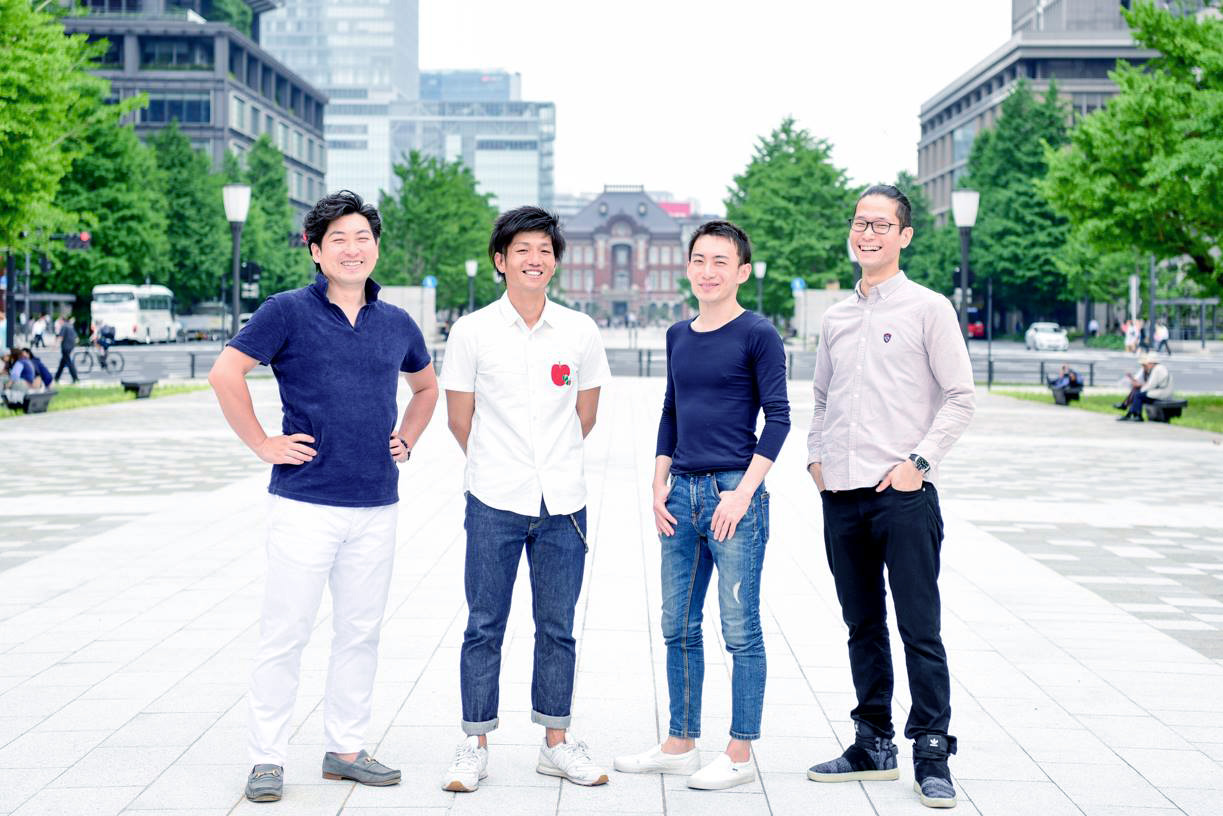The world’s first token economy on cloud computing industry using the blockchain
SINGAPORE – September 16, 2018 – Reindeer Technology PTE. LTD. announced the world’s first token economy initiative for cloud computing industry. And as the first step of implementing this initiative, it has released reindeer token on the blockchain. The initiative is aimed to support creators’ (*1) use of cloud computing and improve their productivity.
Reindeer project: https://reindeer.tech
Whitepaper: https://bit.ly/2p7sFGv
Background and Objectives of the Project
The cloud computing (*2) industry is expected to grow steadily, attracting creators from around the world, and becoming a 302.5 billion USD market by 2021. However, it remains difficult to use, and there is no end of accidents such as security breaches and service outages. Using mechanisms that support the more effective use of cloud computing, the reindeer project aims to avoid such accidents and bring about a world where creators are free to build more appealing services.
The ultimate goal that the reindeer project is working with creators to achieve is the zero marginal cost society. (*3) This is a society in which, as a result of the rich and diverse services that creators provide, the production costs of service delivery approach zero, and consumable resources are optimized. In such a society, it is possible for people all over the world to enjoy an equally prosperous life, and to leave that wealth to posterity.

The release of reindeer tokens
To bring the project to fruition, a phased service release and promotional activities will be carried out. To begin with, the reindeer tokens that form the heart of the token economy have been released on the Ethereum (*5) blockchain network.
Following this release, tokens will be sequentially distributed free of charge to all creators who meet certain requirements. This distribution is intended to form the start of communication with everyone who is planning to participate in this token economy. At a later date, we will report details of the distribution via social media and other media channels.

Team
Shintaro Hara / Founder, CEO
Before striking out on his own in 2011, Shintaro Hara worked as an executive in several system development companies, where he was engaged in new business development and management of the development department. He did contract development work for PaaS utilization projects which Google joined as a technical adviser, as well as for of online services making use of IaaS and the like, for numerous Japanese clients and public institutions. He believes that the active use of advanced technology is key to the evolution of society and the self-actualization of engineers, and has also done extensive work introducing machine learning, natural language and image processing, and geographic information systems. He has been an engineer for over 15 years. He was the technical supervisor of the Japanese-language version of The Definitive Guide to Plone. As he was pondering the problem of the increasing difficulty of cloud computing provision and exploring ways to distribute open designs, Yuki Ikeda—who had been quick to recognize the potential of the blockchain—reached out to Hara, who realized that they should join forces to work on their ideas. They brought in Toshihisa Nakamizu, who excels at project implementation and began work on reindeer.
Yuki Ikeda / Co-Founder, Producer
Yuki Ikeda is a graduate of the University of Tokyo. While in university, he majored in the study of material design and used data science, including databases of physical properties, first-principle calculations, and neural networks, to study what would be the strongest metallic compositions for use in nuclear reactors. He grew aware of the potential of open access and open data as public goods. In 2011, he joined Recruit Co., Ltd., where he was first an engineer on, then responsible for development direction of projects such as Hotpepper Beauty, car sensors, and Rikunabi NEXT. Independently of this work, he also founded an offshore development company in Vietnam. Thinking that he could use the blockchain to visualize the value of information such as human knowledge and wisdom, create new economic spheres, and solve social problems, he reached out to Hara and started this project.
Toshihisa Nakamizu / Co-Founder, Project manager
After graduating from university, Toshihisa Nakamizu worked on large-scale projects at a software company in the role of the systems engineer. He also did project management at KAYAC Inc. He gained experience on many projects, most of them related to online promotion for Japanese clients. After he left KAYAC Inc., he started COMPASS Co., Ltd. “ I want to make small inconveniences more convenient, even just a little.” That was Nakamizu’s motivation for developing apps to make all kinds of things in life a bit more convenient, from restaurants and kindergartens to retirement homes and the neighborhood greengrocer. At the same time, he joined LIG to help with team building. He was in charge of bringing the production team together via team building and organization building. After two years with LIG, he returned to his company and worked as a project manager on a variety of small and large projects.
Shogo Tsuruda / Designer
After dropping out of Waseda University, Shogo Tsuruda became a designer at a company that mainly engaged in creating and operating e-commerce sites. He then moved on to IMJ Corporation, where he created numerous websites for domestic clients. In 2016, he struck out on his own and established the LCC Staraxia. He worked as a web and UI designer for a wide variety of clients, from domestic clients to startups.
Hidetoshi Nakano / Legal adviser
Graduate, Waseda University School of Political Science and Economics. Attorney at law, Grow-will International Law Firm. Director, Mirai Challenge, Inc. CEO, Samurai Innovation PTE. Ltd. (Singaporean corporation) During his university years, he gained experience in starting up systems development and web service businesses, eventually putting those skills to use in his work as a lawyer specializing in the IT industry. He is one of the few Japanese lawyers well-versed in virtual currency laws.
Footnotes
*1 Creator: We refer to all persons involved in the building of any services as creators. This includes the planners, software developers, and engineers, etc. involved in the procurement of infrastructure.
*2 Cloud computing: The token economy is a popular mechanism in behavior analysis that commends and supports “good actions” in a community through a reward system. Thanks to its operational compatibility with the technical features of the blockchain, use of the token economy on blockchains have been spreading to many communities recently.
*3 The zero marginal cost society: It’s the book written by Jeremy Rifkin who is known as the adviser of Merkel, Chancellor of Germany.
*4 Token economies: It is known as a behavioral analysis mechanism that evaluates and supports community’s “good behavior” through a remuneration system such as point system. And since the technical characteristics of the blockchain fit well for its operation, the token economy utilization on the blockchain is now spreading to various communities.
*5 Ethereum: One of the blockchain network similar to a Bitcoin. It is attracting attention as it can provide more complicated functions useful for the realization of the token economy than Bitcoin.
Media Contact:
Shintaro Hara, Yuki Ikeda
REINDEER TECHNOLOGY PTE. LTD.
press@reindeer.tech
For more detail:
https://reindeer.tech
https://medium.com/reindeer-project
Tweets by reindeer_press




